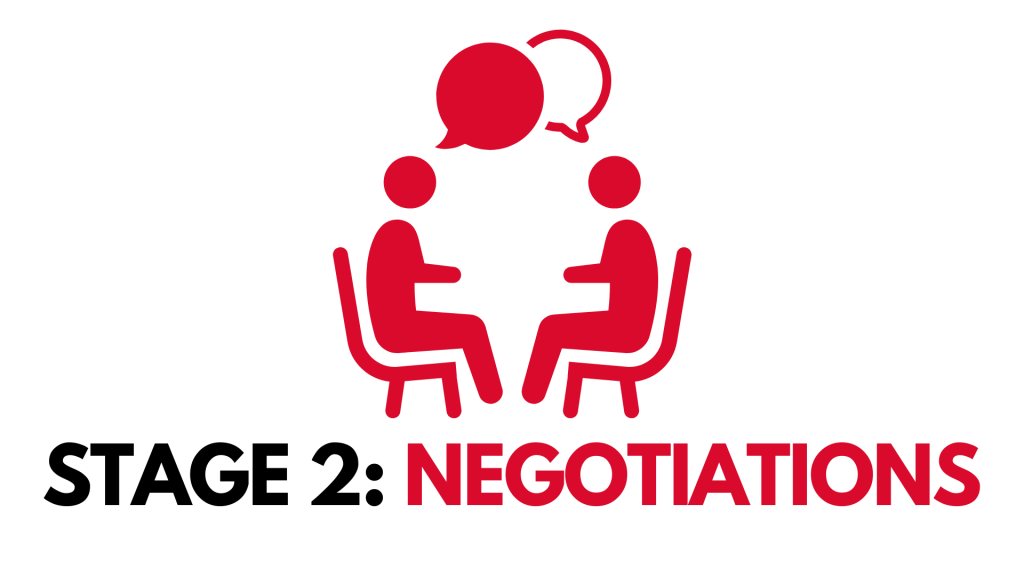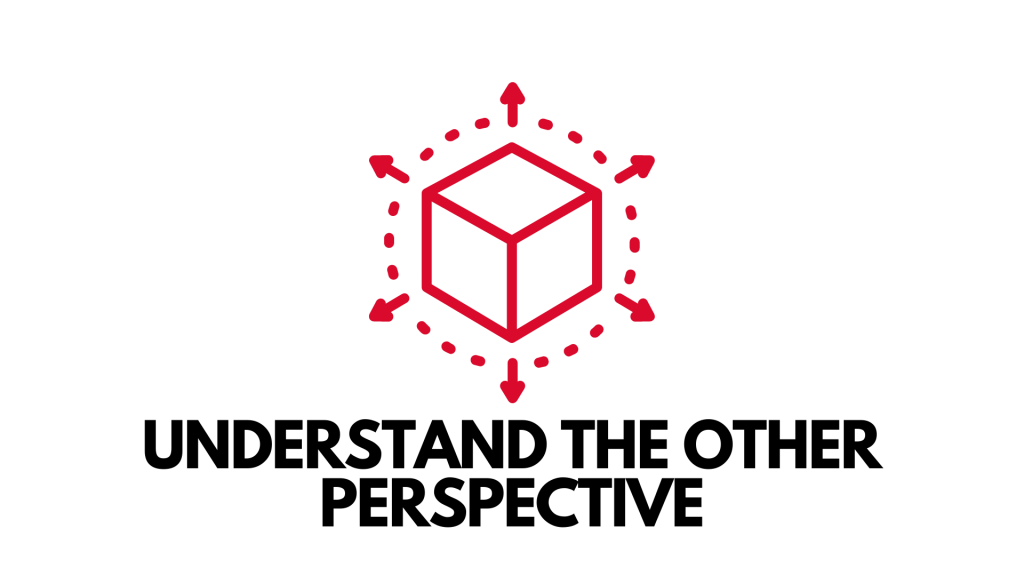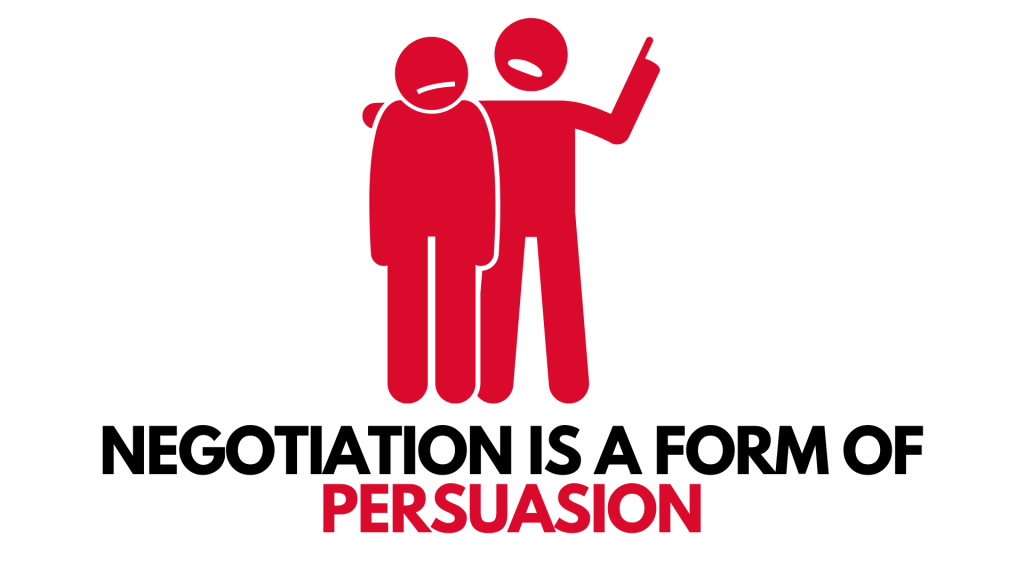Part—2 of the article talks about two essential tools of negotiation: power and psychology. The second part of the article discusses the second part of the process of negotiation: Negotiate: Use Key Tactics for Success.
For the second part of the article: Negotiation, there are three things to note and think about significantly. The number one is to get to know the other side, then comes understanding your power, and the number three is using psychological tools and avoiding traps.
2.0 Negotiations: Use Key Tactics For Success

Getting To Know the Other Side
Information is one of the most critical factors in bringing negotiations to a successful finish. Obtaining the necessary information to understand better the other side is crucial to effectively preparing for the dispute resolution. We’ll show you how to do it today.
To get to know the other side, one of the most important things to do is prepare. To know who you are up against is one of the most important things to know, and to do so, preparation is essential.

In the second part of negotiations, using key tactics means knowing who you are dealing with initially. To do so, there are some key things to do:
1. Doing Some Background Research
Concentrate on learning about the other party’s background. Look into their previous deals. What type of agreements do they strike, whether or not they could meet their interests, and which negotiation styles and approaches do they prefer to use? Finding out such information will make your job a lot easier.
2. Check with the Past Negotiators
Asking others who have previously bargained with your adversary is the simplest way to learn more about them. In addition, because this will most likely not be your “opponents'” first negotiation, locating others who have bargained with them can be pretty helpful in determining how the other side of the table thinks.
3. Explore the Environment
Another simple technique to learn more about the folks we will be negotiating with is to chat with someone who works with them. For example, you may contact someone in charge of the negotiation process; inquire about their current situation, the types of decisions, what motivates them, and any other inquiries that may ultimately benefit you.
4. Do an Internet Search
The Internet may be a convenient and quick tool to learn more about the persons we will begin a discussion with. For example, you can check the Bar Association if your interlocutor is a lawyer; if they are an entrepreneur, you might be able to obtain information in a business community. The Internet and professional associations are readily available resources that we should take advantage of.
5. Make Notes
When the negotiations begin, it is also a perfect moment to obtain information from the other party to aid us in the remainder of the process. Therefore, it is customary to have a more relaxed chat at first, from which we can gather data and personal information that may give us hints about their conduct.
To be a good negotiator, one must know and understand their power and possess and understand who they are up against. Imagine a person has done thorough research on who they are up against but, in the meantime, forgot to understand and research about themselves and the powers they have to turn the tables around in any negotiation. This scene would not churn out in a good way. So, what does one do in such a situation?
Power in Negotiation
Some people, particularly traditionalists, consider negotiating a form of persuasion. But, of course, you’re attempting to persuade someone else to act in your favor. When, in fact, the finest negotiators are the ones who, while they may be persuasive, are the ones who ask questions, gather facts, and then analyze your position and interests using that knowledge.

Not only should you ask questions, but you should also pay close attention to the responses. And think about the reactions; that’s why God gave us two ears and one mouth, in his opinion. As a result, we may devote more time to listening rather than speaking.
According to the study, some studies of German negotiators and Chinese negotiators that have been published suggest that Chinese negotiators asked three times as many questions as German negotiators. As a result, the Chinese negotiators are gathering even more data to use in the negotiations.
More than only for bargaining purposes, the capacity to ask questions and listen is essential. I worked for a vast international consulting firm for several years. Your strength is derived from the information you obtain by asking questions and carefully listening to the replies. There is, however, a more specific aspect of power there. In negotiations, there is one piece of information that is particularly significant. This piece of knowledge has already been discussed in another context.
In a negotiation, the particular piece of information that is highly helpful is information on the other side’s BATNA. And there’s a reason behind that. BATNA provides you power, and BATNA gives the opposing side power.
The best alternative to a negotiated agreement, or BATNA, gives you leverage such that if your BATNA is solid, you can deal much more and from a much stronger position. Because you have a terrific alternative, you have a lot more strength. Given that your BATNA gives you power, one of the first things you should do in a negotiation is figured out how powerful the other side is by figuring out what their BATNA is.
If your BATNA is weak and your options are inadequate, you’re negotiating from a vulnerable position. Then you don’t want the opposite side to find out what your BATNA is. But, on the other hand, if your BATNA is strong, you want them to know it since they know it will be easy for you to walk away and seek the alternative if they know what it is.
Now, one of the other most important parts of any negotiation is being able to use psychological tools.
Mythical Fixed Pie Assumption
The belief that there is a set pie of resources is one of the most harmful assumptions we bring to discussions. The complexity of integrative negotiations is a plus for those negotiators who see chances to expand the pie of value through mutually agreeable tradeoffs among topics. You and your negotiation partner can accomplish more using tradeoffs than if you simply compromised on each issue.
The imaginary “fixed pie” perspective encourages us to see competitive circumstances as solely win-lose situations in many conversations. The mythical fixed pie assumption is all about psychologically dealing with negotiation. For negotiation, there are few psychological tools.
Psychological Tools

1. Anchoring
The anchoring bias is a well-known cognitive bias that reflects the typical propensity to place too much weight on the first number presented in a debate and then poorly adjust from that starting position, or “anchor.” Even though we know that anchors are unrelated to the topic, we become fixated on them.
According to research on the anchoring bias, negotiators might gain an advantage by making the first offer and anchoring the conversation in their favor. The decision to make the first offer should be founded on two factors: your understanding of the zone of probable agreement or ZOPA—that is, the range of options that should be acceptable to both parties—and your judgment of the other party’s understanding of the ZOPA.
What should you do if your opponent drops the first anchor? The first and perhaps most critical stage is to recognize the move. Then, respond with a counteroffer before defusing the other side’s anchor in negotiation. If someone starts with Rs. 1,00,000, and you wish to respond with Rs. 50,000, you must explain that Rs. 1,00,000 is just unacceptable before delivering your figure.
2. Overconfidence
Overconfidence is a topic that has been researched in a variety of fields. For example, finance professors in business schools are fascinated by overconfidence since it is linked to stock market trading. And it is believed that their main conclusion is that people trade too much due to overconfidence. As a result, they lose more money than they should due to over-trading and transaction fees.
Professors of accounting are fascinated by the topic of overconfidence. For example, they examine managers’ earnings estimates. And because of their overconfidence, managers who are good at producing short-term earnings estimates are generally lousy at making long-term projections.
3. Framing
The concept of negotiation framing emphasizes how we express our proposals has a significant impact on how others perceive them. For example, people resist compromises—and proclaim impasse—framed as losses rather than wins, according to studies by Max Bazerman, Margaret Neale, and Tom Magliozzi.
4. Availability
The capacity to be available is beneficial in many ways. For example, it’s been used by several successful investors over the years. This was one of the primary recommendations in making investment selections for an investor who controlled a large mutual fund. He didn’t want to be enslaved by the concept of availability. He wanted to avoid depending too heavily on readily available information, so he looked for organizations that were a little blander and duller.
5. Escalation
Escalation is a more concentrated effort to win. It might be unilateral or bilateral, but it is a response action in either case. A party escalates unilaterally in response to its previous step or the inadequacy of that action. Each party responds to the other’s increased endeavor to prevail bilaterally, which is the more typical understanding of the phrase.
Escalation is the pursuit of conflict to end it. However, the intended end can be on the escalator’s terms, such as victory, or mutually agreed on terms, such as negotiation. Escalation stops when the parties are unable or unwilling to escalate any further, when one or both parties run out of resources, when one wins, or when both reach an agreement that resolves the incompatibility of positions.
Escalation and negotiation are opposed actions, with the former increasing conflict and the latter decreasing it. They not only go in opposite directions, but they also require different attitudes and convictions: one is to defeat the enemy, while the other is to come to terms with them, which is frequently referred to as winning versus a composting mentality.
